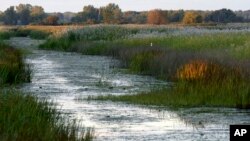America’s freshwater supply has emerged as the latest ecological battleground between the Republican-led Congress and the Obama administration.
The Senate passed a bill 53-to-44 Wednesday disapproving the administration’s new rules aimed at protecting wetlands and waterways from pollution and environmental degradation.
At issue is whether those rules, crafted by the Environmental Protection Agency, constitute a reasonable attempt to safeguard America’s freshwater supply or a massive bureaucratic power grab that will subject farmers and other landowners to onerous federal oversight and regulations.
“It would force Americans who live near potholes and ditches and puddles to ask bureaucrats for permission to do just about anything on their own property,” Senate Majority Leader Mitch McConnell said.
“That is nonsense,” countered Democratic Senator Barbara Boxer. “The fact is, the clean water rule is going to protect the drinking water of 117 million Americans.”
Ecological damage
Fellow-Democrat Ben Cardin noted the EPA’s rules stem from a 1970s-era law, the Clean Water Act, that sought to reverse decades of ecological damage to America’s streams, rivers and lakes.
“It was a response to rivers literally catching fire and dead zones being found in our lakes,” Cardin said. “Every Congress has tried to strengthen the Clean Water Act, not weaken it.”
The White House has promised to veto any bill undoing the EPA’s new rules, which set guidelines for bodies of water found in proximity to waterways.
Opponents contend the rules were crafted so broadly that almost any spot where water collects naturally on private property would invite intrusive federal regulation.
“This rule is so complex and so ambiguous that folks in my state are concerned that any low spot on a farmer’s field or a puddle after a rainstorm may now fall under the EPA’s watch,” Republican Senator Joni Ernst of Iowa said.
“This rule and this debate isn’t about clean water,” Ernst added. “The heart of this debate is about how much authority the federal government and unelected bureaucrats should have to regulate what is done on private property.”
Pending showdown
Democrats ridiculed that line of argument.
“The pretense is that some evil bureaucratic force at the EPA has leapt out to take over Americans’ farms and ranches. That’s not what happened,” Senator Sheldon Whitehouse of Rhode Island said. “The Supreme Court made decisions about what the Clean Water Act says, and EPA had to follow the Supreme Court’s guidance, which they did.”
In 2006, the Supreme Court set forth that a wetland or isolated stream must have a “significant nexus” to a navigable waterway to fall under the Clean Water Act’s protections. The EPA’s new rules are the Obama administration’s attempt to define what that standard means in terms that can be applied nationwide.
The issue could return to the Supreme Court before the debate is resolved legislatively. A federal appeals court has blocked the EPA’s rules nationwide, a decision that is likely to be appealed.
Aside from clean water rules, the EPA has been at loggerheads with Republican lawmakers for years over carbon emissions from power plants, ozone reduction, and regulating the coal industry.




